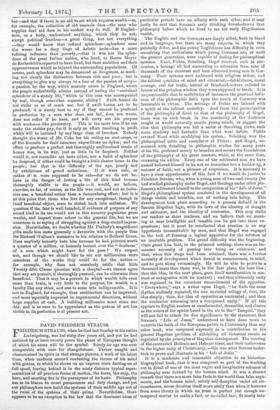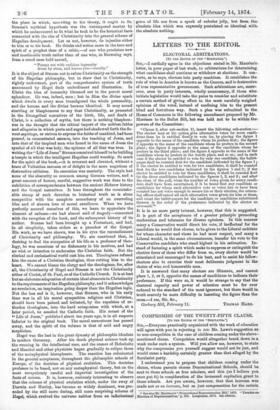DAVID FRIEDRICH STRAUSS.
pRIEDRICII STRAUSS, when he died last Sunday in his native
particular periods have an affinity with each other, and it may justly be said that Strauss's early thinking foreshadowed that philosophy before which he lived to see his early Ilegelianism vanish.
The English and the Germans are deeply allied, both in blood and in language, but there are many respects in which they pointedly differ, and the young Englishman has difficulty in even conceiving that enthusiasm which young Germans are, or until the present generation, were capable of feeling for philosophical systems. Kant, Fichte, Schelling, Hegel received, each in suc- cession, a homage all but amounting to adoration from tens of thousands of the cleverest and best educated young men in Ger- many. Their systems were embraced with religious ardour, and the noblest qualities of mind and character,—faithfulness, moral courage, zeal for truth, hatred of falsehood,—were enlisted in favour of the priceless wisdom they were supposed to teach. It is unquestionable that in multitudes of instances the practical influ- ence of this philosophic faith upon the youth of Germany was favourable to virtue. The writings of Fichte are imbued with a 'spirit of the loftiest morality. And from the promulgation of the philosophy of Kant to that of the philosophy of Hegel, there was no such break in the continuity of the doctrines taught as would naturally startle young minds, or suggest the idea that philosophy was but a series of dissolving views, each more shadowy and fantastic than what went before. Fichte revered Kant while modifying his system ; Schelling was the philosophical critic and emendator of Fichte ; and Hegel, as- sociated with Schelling in philosophic studies for many years of his life, professed merely to broaden and secure the foundations of the philosophy of his great masters, while, at the same time, crowning the edifice. Every one of the celebrated men we have named believed himself to be not an iconoclast but a builder up, a restorer of faith, not a pioneer of scepticism. It is necessary to have a clear apprehension of this fact if we would do justice to Friedrich Strauss, who, when a young man of two-and-twenty (he had studied philosophy under Hegel, and theology under other pro- fessors), addressed himself to the composition of his" Life of Jesus." Hegel's philosophical system consisted in the development of all
things visible and invisible, out of nothing into being. This development took place according to a process defined in the famous Hegelian logic, with its laws of the identity of thought and existence, and the identity of contraries. This may strike our readers as sheer madness, and we believe that no mean- ing at once intelligible and tenable can be got into these ex- pressions ; but it must be recollected that creation is on any hypothesis inconceivable by man, and that Hegel was engaged in the task of framing a logical apparatus for the solution of an insoluble problem. The grand difficulty was the beginning. Once grant him that, in the primeval nothing, there was an im- manent necessity of passing into being or existence, and that, when this stage had been attained, there was a further necessity of development which issued in consciousness, in mind, and he gets along swimmingly. He will be able to prove in a thousand cases that there was, in the first place, the bare idea ; that this idea, in the next place, gave itself manifestation in con- trast or antagonism with its contrary ; and that ultimately unity was regained in the conscious reconcilement of the opposites. "Everywhere," says a writer upon Hegel, "he finds the same rhythm endlessly repeated, the one unvaried trilogy of, first, the idea simply ; then, the idea of opposites as contrasted ; and then the contraries returning into a recognised unity." If all this appears to English readers as unsubstantial, dreamlike, and elusive as the voices of the spirits heard in the air in the "Tempest," they will not fail to attach its due significance to the statement that Strauss's "Life of Jesus," understood to have done more to unsettle the faith of the European public in Christianity than any other book, was composed expressly as a contribution to the general Hegelian problem of exhibiting all historical events as regulated by the principles of Hegelian development. The meeting of the contrasted Hellenic and Hebraic ideas, and their coalescence in the higher unity of Christianity,—this was what Strauss under- took to prove and illustrate in his "Life of Jesus."
It is a moderate and reasonable objection to an historico- biographical book, that it was composed as part of the working out in detail of one of the most vague and imaginative schemes of philosophy ever devised by the human mind. It was a shrewd remark that there are more false facts in the world than false argu- ments, and the human mind, subtly self-deceptive under all cir- cumstances, never deceives itself more easily than when it borrows from some theory in which its trust is perfect just enough nu- tempered mortar to make a fact, or so-called fact, fit neatly into the place in which, acccrding to the theory, it ought to lie. Strauss's mythical hypothesis was the untempered mortar by which he endeavoured to fit what he took to be the historical facts connected with the rise of Christianity into the general scheme of Hegelian development. Let us not, however, do injustice either to him or to his book. He thinks and writes more in the tone and spirit of a prophet than of a critic,—of one who proclaims new and inestimable truth rather than of one who, as Browning says, from a creed once held sacred,
"Pumps out with ruthless ingenuity Atom by atom, and leaves you—vacuity."
It is the object of Strauss not to refute Christianity on the strength of his Hegelian philosophy, but to show that in Christianity, rightly understood, part of the comprehensive system of truth announced by Hegel finds embodiment and illustration. In Christ the idea of humanity bloomed out in the purest moral splendour. He was, indeed, man ; but in Him the divine spark which dwells in every man transfigured the whole personality, and the human and the divine became identical. It may sound startling or blasphemous to say that Christianity, as presented in the Evangelical narratives of the birth, life, and death of Christ, is a collection of myths, but there is nothing blasphem- ous in the thought that the ethical import of the noblest fables and allegories in which poets and sages had shadowed forth the de- vout aspirings, or striven to express the faiths of mankind, had been poured, in concentrated essence, into the teaching of Jesus, and into that of the inspired men who found in the name of Jesus the symbol of all that was holy, the epitome of all that was true. In writing the "Life of Jesus" Strauss conceived himself to be building a temple in which the intelligent Hegelian could worship. So much for the spirit of the book,—it is reverent and elevated, without a trace of Voltairian sarcasm or of delight in the mere negations of -destructive criticism. Its execution was masterly. The style had none of the obscurity so common among German writers, and a great amount of honest, careful, suggestive work was done in the exhibition of correspondences between the ancient Hebrew history and the Gospel narratives. It bore throughout the unmistake- able stamp of such devotion to historical truth as is alone compatible with the complete ascendancy of an overruling idea and of sincere love of moral excellence. When we have perfectly assured ourselves of this, we learn to appreciate the element of sadness—we had almost said of tragedy—connected with the reception of the book, and the subsequent history of its author. Strauss had been brought up a Protestant, and had, in all simplicity, taken orders as a preacher of the Gospel. His work, as we have shown, was in his eyes the reconcilement of Christianity and philosophy. We are convinced that, in desiring to find the occupation of his life as a professor of theo- logy, he was conscious of no dishonesty in his motives, and had no wish or intention to undermine the Christian faith. But the clerical and ecclesiastical world cast him out. Theologians refused him the name of a Christian theologian, thus cutting him to the heart. We cannot blame the clergy and the theologians, for, after all, the Christianity of Hegel and Strauss is not the Christianity either of Christ, of St. Paul, or of the Catholic Church. It is at best but an elaborate adaptation of certain ideal elements in Christianity to the requirements of the Hegelian philosophy, and it acknowledges no revelation, no inspiration going deeper than the Hegelian logic. Not the leas sad is it, however, that Strauss, who in his early time was in all his moral sympathies religious and Christian, ahould have been pained and irritated, by the repulsion of or- thodox theologians, into the hard antagonism with which, at a later period, he assailed the Catholic faith. His recast of the 66 Life of Jesus," published about ten years ago, is in all respects Inferior to the original book. The moral earnestness has passed away, and the spirit of the volume is that of arid and angry ;scepticism.
Hegel was the last in the great dynasty of philosophic idealists in modern Germany. After his death physical science took up the running in the intellectual race, and the names of Helmholtz and Haeckel and other physicists began gradually to eclipse those of the metaphysical hierophants. The reaction has culminated in the general acceptance, throughout the philosophic schools of Europe, of the doctrine of physical evolution. This doctrine professes to be based, not on any metaphysical theory, but on the most scrupulously careful and impartial investigation of the facts of nature. It is, however, curiously interesting to observe that the scheme of physical evolution which, under the sway of Darwin and Huxley, has become so widely dominant, was pre- ceded by the still more daring, still more surprising scheme of Hegel, which evolved the universe neither from an infinitesimal germ of life nor from a speck of nebular jelly, but from the absolute idea which was expressly postulated as identical with the absolute nothing.



































 Previous page
Previous page